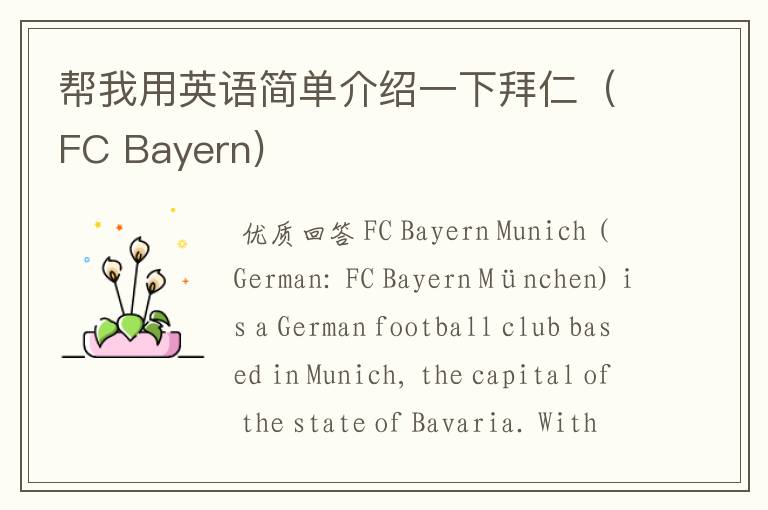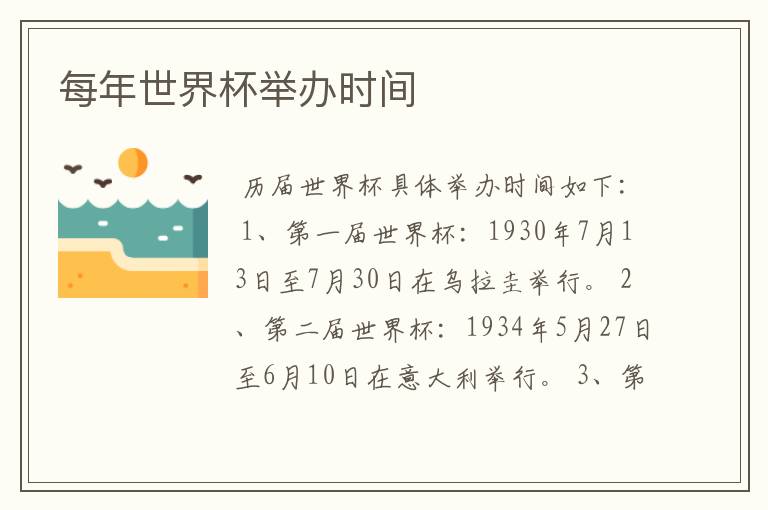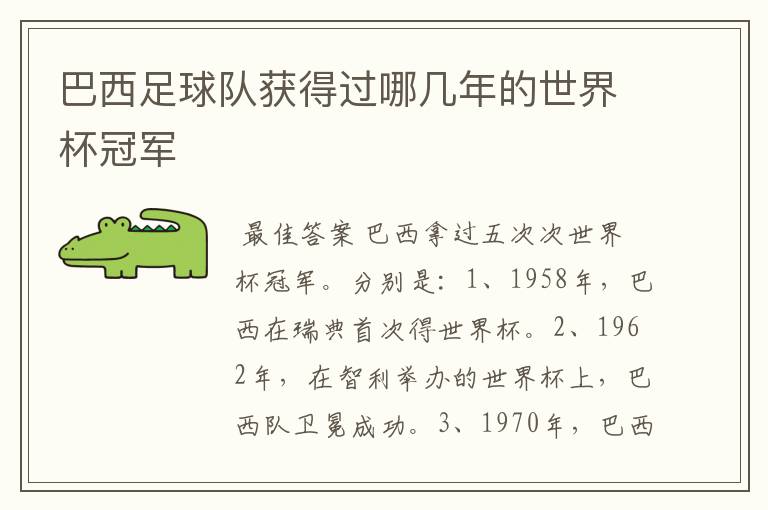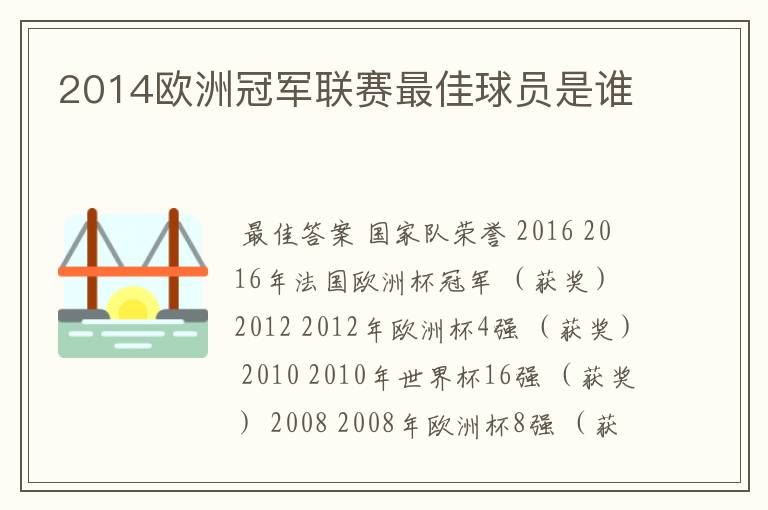还是支持拜仁英语怎么说
今天运困体育就给我们广大朋友来聊聊德甲球员谁帅啊英语怎么说,希望能帮助到您找到想要的答案。
帮我用英语简单介绍一下拜仁(FC Bayern)

优质回答FC Bayern Munich (German: FC Bayern München) is a German football club based in Munich, the capital of the state of Bavaria.
With 2 Intercontinental Cups, 4 European Champions League titles,1 UEFA Cup title, 1 Cup Winners' Cup title, 20 national championships, and 13 German Cups, Bayern Munich is Germany's foremost football club. Bayern is a membership based club and with more than 120,000 members, the third largest in the world after SL Benfica and FC Barcelona.
Bayern also maintains departments for chess, handball, basketball, gymnastics, bowling and table tennis.
小小求助,一些很简单的翻译,英语达人帮帮我吧
优质回答1. I only know that it is a really big city. It also has a Bayern Munich club.
2.When I was in high school, I liked Bayern Munich very much. Germany and China has six hours of time difference, so I always stay at night to see the live games. Sometimes I was even late for school because of that.
3. Did you go to see the real FIFA World Cup in 2006 Germany vs. Italy, I was betting with my mom about who will win, then I lost for 200 RMB. But still that game was really great!
用英文简介一下拜仁
优质回答Bayern Munich was founded in 1900 by members of a Munich gymnastics club. The club played its first games in the regional Bayern league. Bayern’s first success came in 1926 in the form of the championship of southern Germany, an achievement repeated two years later. Their first national honour was gained in 1932, winning the German championship by defeating Eintracht Frankfurt 2-0 in the final. The advent of the Hitler regime put an abrupt end to Bayern’s development. The president and the coach, both of whom were Jewish, left the country. Many others in the club also saw themselves purged. In the following years, Bayern, taunted as the “Jew’s club”, decayed into irrelevance.
After the war Bayern became a member of the southern conference of the German first division, which was split five ways at that time, the Oberliga Süd. Bayern struggled, and in 1956 suffered the ignominy of relegation. The following season the club returned to the Oberliga and even won the German Cup for the first time, beating Fortuna Düsseldorf 1-0 in the final. The club progressed to become one of the better sides of the league, but struggled financially, verging on bankruptcy at the end of the 1950s. Manufacturer Roland Endler provided the necessary funds and was rewarded with four years at the helm of the club. In 1963 the Oberligas in Germany were consolidated to one national league, the Bundesliga. Bayern were denied membership, but gained promotion two years later, fielding a team with young talents like Franz Beckenbauer, Gerd Müller and Sepp Maier - who would later be collectively referred to as the axis.
After the war Bayern became a member of the southern conference of the German first division, which was split five ways at that time, the Oberliga Süd. Bayern struggled, and in 1956 suffered the ignominy of relegation. The following season the club returned to the Oberliga and even won the German Cup for the first time, beating Fortuna Düsseldorf 1-0 in the final. The club progressed to become one of the better sides of the league, but struggled financially, verging on bankruptcy at the end of the 1950s. Manufacturer Roland Endler provided the necessary funds and was rewarded with four years at the helm of the club. In 1963 the Oberligas in Germany were consolidated to one national league, the Bundesliga. Bayern were denied membership, but gained promotion two years later, fielding a team with young talents like Franz Beckenbauer, Gerd Müller and Sepp Maier - who would later be collectively referred to as the axis.
1970 saw a new coach, Udo Lattek, taking charge. After winning the cup in his first season he led Bayern to their third German championship. The deciding match in the 1971-72 season against Schalke 04 was the first match in the brand new Olympic Stadium, and was also the first live televised match in Bundesliga history. Bayern swept Schalke away 5-1 and thus claimed the title, also setting several records, including points gained and goals scored. Bayern also won the next 2 championships, but the zenith was the triumph in the 1974 European Champions Cup final against Atlético Madrid, which Bayern won 4-0 after a replay. In the following season the team was unsuccessful domestically, but defended their European title by defeating Leeds United in the final when “Bull” Roth and Müller secured victory with their late goals. A year later in Glasgow, AS Saint-étienne were defeated by another Franz Roth goal and Bayern became the third club to win the trophy in 3 consecutive years. The final trophy won by Bayern in this era was the Intercontinental Cup, in which Brazilian club Cruzeiro Belo Horizonte were defeated over two legs.
The 1980s were a period of off-field turmoil for Bayern, with many changes in personnel and financial problems. On the field, the Bundesliga title was won in 1980 and 1981, but two trophyless seasons followed, after which former coach Udo Lattek returned. Bayern won the 1984 cup final, then went on to win 5 championships in 6 seasons, including a double in 1986. However, European success was elusive during the decade; Bayern only managed to claim the runners-up spot in the European Cup in 1982 and 1987. Bayern’s form dipped after their 1990 championship win, the club finishing just five points above the relegation places in 1991/92. Success returned when Franz Beckenbauer took over for the 2nd half of the 1993-94 season, winning the Championship again after a 3 year gap. Beckenbauer was then appointed club president, but his successors as coach did not meet expectations. During this time Bayern’s players frequently appeared in the gossip pages of the press rather than the sports pages, resulting in the nickname FC Hollywood. Franz Beckenbauer returned as coach, and led his team to victory in the 1996 UEFA Cup, beating Bordeaux in the final.
The 1980s were a period of off-field turmoil for Bayern, with many changes in personnel and financial problems. On the field, the Bundesliga title was won in 1980 and 1981, but two trophyless seasons followed, after which former coach Udo Lattek returned. Bayern won the 1984 cup final, then went on to win 5 championships in 6 seasons, including a double in 1986. However, European success was elusive during the decade; Bayern only managed to claim the runners-up spot in the European Cup in 1982 and 1987. Bayern’s form dipped after their 1990 championship win, the club finishing just five points above the relegation places in 1991/92. Success returned when Franz Beckenbauer took over for the 2nd half of the 1993-94 season, winning the Championship again after a 3 year gap. Beckenbauer was then appointed club president, but his successors as coach did not meet expectations. During this time Bayern’s players frequently appeared in the gossip pages of the press rather than the sports pages, resulting in the nickname FC Hollywood. Franz Beckenbauer returned as coach, and led his team to victory in the 1996 UEFA Cup, beating Bordeaux in the final.
Prior to the start of the 2005-06 season, Bayern moved from the Olympic Stadium to the new Allianz Arena, which the club shares with TSV 1860. In summer 2006 TSV 1860 Munich had to sell its party of the Allianz Arena to Bayern Munich due to a financial crisis. Bayern Munich now is the single owner of the Arena but both clubs hope that TSV 1860 Munich will repurchase its parts as soon as possible.
The current Bayern manager is Ottmar Hitzfeld, who returned to Munich in January 2007 after Felix Magath was sacked. In his first term at Bayern between 1998 and 2004 he won 4 Bundesliga titles, two DFB Pokals and the 2000-01 UEFA Champions League.
今天的内容先分享到这里了,读完本文《还是支持拜仁英语怎么说》之后,是否是您想找的答案呢?想要了解更多,敬请关注www.zuqiumeng.cn,您的关注是给小编最大的鼓励。
本文来自网络,不代表本站立场,转载请注明出处:https://www.zuqiumeng.cn/wenda/734176.html




